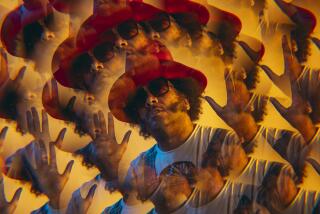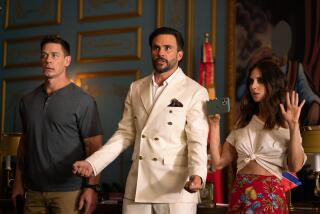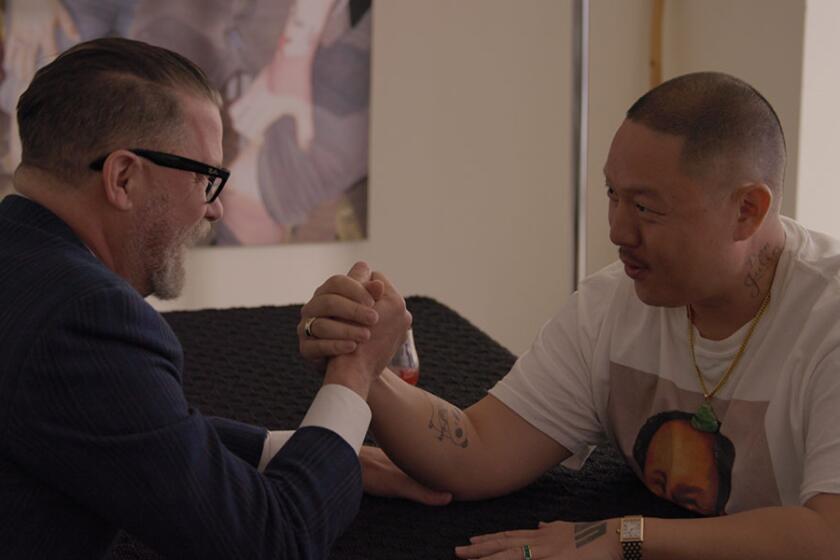Review: Alison Brie reveals new layers in subversive and playful ‘Horse Girl’
Alison Brie gets weird with her indie feature “Horse Girl,” which she co-wrote, produced and stars in as the title character, a label for a certain type of young woman most often found in middle schools. Brie has demonstrated her remarkable acting range with her performances on “Mad Men,” “Community” and “GLOW,” but her screenwriting debut, in collaboration with director Jeff Baena, feels like a peek inside her brain. What we find is far more uncanny and out-there than anyone may have expected.
“Horse Girl” starts out as a typical indie dramedy about an oddball character, Sarah (Brie), and her banal life. Though the film opens on a cheerful conversation between Sarah and her closest confidante, Joan (Molly Shannon), a co-worker at a craft store, it’s soon painfully obvious that Sarah is stuck in a state of awkward arrested development. She lingers inappropriately at the stable where she used to ride as a kid and binge-watches a supernatural crime procedural called “Purgatory,” struggling to connect to her peers, including her roommate, Nikki (Debby Ryan).
Through Brie’s earnest performance, we instantly recognize the naive Sarah, stuck in her ways as a form of protection, a coping mechanism. But there are flourishes of the bizarre, horrific and macabre that linger around the edges of “Horse Girl,” and Baena lets them peek out. A sweeping camera movement suggests melodrama, a quick edit a suspense thriller, a disturbing reveal something out of a horror movie. It’s clear that there are far more strange and sinister things afoot than just a lonely girl searching for some kind of human connection.
Sarah sleepwalks and her nose bleeds, both at inopportune times. She loses her car in strange places. She dreams of a white void and believes she’s losing whole chunks of time during these spells. The people to whom she confesses these experiences urge her to see a doctor, but Sarah has far grander theories, involving the paranormal, quite like the TV show she watches night after night, where clones and aliens and demons are routine.
As these events escalate, Sarah leans in to her unique beliefs about time, her identity and her family — her origin and her destiny. In these moments, “Horse Girl” takes on a curious perspective, showing the audience her dreams, the time loss, her fantasies, thereby conferring authenticity through imagery. While everyone around Sarah interprets her behavior as a mental breakdown, by aligning us with her perspective, “Horse Girl” suggests: What if it’s real? What if she’s right?
Brie is a skilled and likable performer who can elicit a tremendous amount of sympathy; with her large eyes, she calls to mind Maria Falconetti, and Sarah’s misunderstood zealousness in her own beliefs could be compared to Falconetti’s portrayal of the French martyr in Carl Dreyer’s “The Passion of Joan of Arc.” Though Sarah is baffling in many ways, and Brie and Baena’s script can’t quite sustain its own extraterrestrial ambitions, “Horse Girl” wants to let the audience in on its offbeat perspective, not shut us out.
Ostensibly, this is a tragedy about mental illness, and the way that someone can slip through the cracks in society without family, friends and a network of support. But “Horse Girl” is far more subversive and playful than just that, allowing for Sarah’s peculiar reality to envelope our own.
‘Horse Girl’
Rated: R, for language and some sexuality, graphic nudity and drug use
Running time: 1 hour, 48 minutes
Playing: Starts Feb. 7, Vintage Los Feliz 3; also available on Netflix
More to Read
Only good movies
Get the Indie Focus newsletter, Mark Olsen's weekly guide to the world of cinema.
You may occasionally receive promotional content from the Los Angeles Times.










